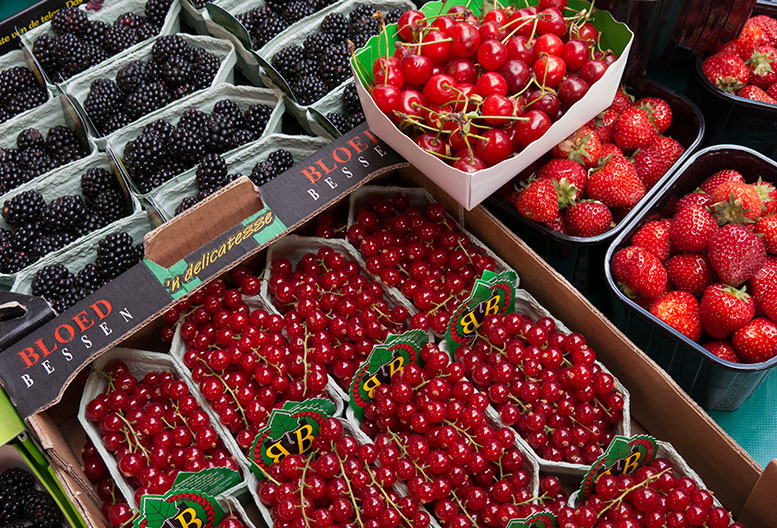- Free radicals are potentially harmful, reactive and unstable molecules that can damage our tissues and have been associated with accelerated aging.
- Antioxidants are nutrients that scavenge free radicals in the body before they cause damage.
- Consider eating colorful fruits and vegetables (especially raw) everyday as part of a healthy nutrition pattern to maximize antioxidant intake.
During the normal process of breaking down and generating energy from food, highly reactive and unstable free radicals may be formed. Free radicals ‘attack’ DNA, proteins, and lipids (fats) in the body, causing oxidative damage that may lead to cardiovascular disease, cancer, arthritis, and a weakened immune system. Rusting metal is an example of oxidative damage. So, when your body experiences oxidative damage think of it as rusting.
Antioxidant vitamins
The three most prominent known antioxidant vitamins are vitamin C, vitamin E, and beta-carotene. The pigments that give fruits and vegetables like carrots, cantaloupe, sweet potato, and kale their vibrant orange, yellow, and green colors are called carotenoids. Carotenoids, such as lycopene, lutein, and zeaxanthin, are examples of potent antioxidants that may have cancer preventing properties. These antioxidant compounds are found in colorful fruits and vegetables especially those that appear red, orange, yellow, blue, and purple. Antioxidant vitamins and related nutrients can be destroyed by cooking, so to secure the most benefit eat these foods raw. Fruits and vegetables high in antioxidant vitamins include: berries, cherries, citrus fruits, carrots, red grapes, mango, papaya, tomatoes, beets, pumpkin, broccoli, and leafy greens. Zinc and selenium are minerals that may also act as antioxidants and can be found in beans, nuts, whole grains, poultry, and other animal products.
Antioxidants: to supplement or not?
Antioxidants are vitamins, minerals, and other nutrients abundant in certain food groups that act as ‘superheroes’ by scavenging free radicals. However, preventing disease and improving health with antioxidant dietary supplements — while appealing is controversial and may even carry risk .
Studies with the potent antioxidant beta-carotene have shown signals of increased lung cancer and there are reports of increased skin cancer with vitamin C, vitamin E, beta-carotene, selenium, and zinc.
- Vitamin E, the darling vitamin in cardiology more than three decades ago, failed to offer any expected heart benefits in multiple large well-done trials including the nearly 40,000 participant, 10-year Women’s Health Study. Natural vitamin E 600 IU compared to placebo found no difference in heart disease or cancer rates.
- The Selenium and Vitamin E Cancer Prevention Trial (SELECT) considered selenium and vitamin E supplements, taken alone or together, did not prevent prostate cancer and after a longer followup period, a reanalysis found that vitamin E supplements increased the occurrence of prostate cancer by 17 percent in men who received the vitamin E supplement alone compared with those who received placebo.
- The Physicians’ Health Study II found no benefit in reducing the risk of heart attack, stroke, or death from cardiovascular disease, cancer, or cataracts with vitamin E or vitamin C supplements but vitamin E supplements increased risk of brain hemorrhage.
- The large Women’s Antioxidant Cardiovascular Study, another antioxidant trial, studied vitamin E, C, and/or beta-carotene but again failed to be any better than placebo in prevention of heart attack, stroke, or heart disease death rates.
Oxidative stress likely plays a role in a variety of diseases such as cancer, cardiovascular diseases, diabetes, Alzheimer’s disease, Parkinson’s disease, and eye diseases such as cataracts and age-related macular degeneration. There is now some evidence of benefit for reducing the progression of macular degeneration but unfortunately there is no evidence of any more compelling benefits. Despite this fact, the $500 million dollar dietary supplement industry continues to thrive. Antioxidants have found their way into many processed foods from breakfast cereals to energy drinks with the promise to prevent heart disease, dementia and cancer among others. Consumers can be tricked by the antioxidant label to consider a product of higher nutritional value and a healthier choice -an example of the health halo-effect.
- There are now some positive findings with antioxidants in the Age-Related Eye Disease Study (AREDS) study. The combination of vitamin C, E, beta-carotene, zinc, lutein and zeaxanthin, have been associated with some benefits with decreased progression of age-related macular degeneration — but without benefits for cataracts.
Summary
Multiple studies point us to a consistent and powerful message — it is the total nutrition pattern — rather than specific “super-foods” or dietary supplements that can best maintain health and provide the best chance for healthy aging. Eating whole fruits, vegetables, and whole grains — all rich in antioxidants, are important components of a healthy nutrition pattern that is indispensable to a healthy lifestyle that avoids of tobacco and promotes aerobic activity.

